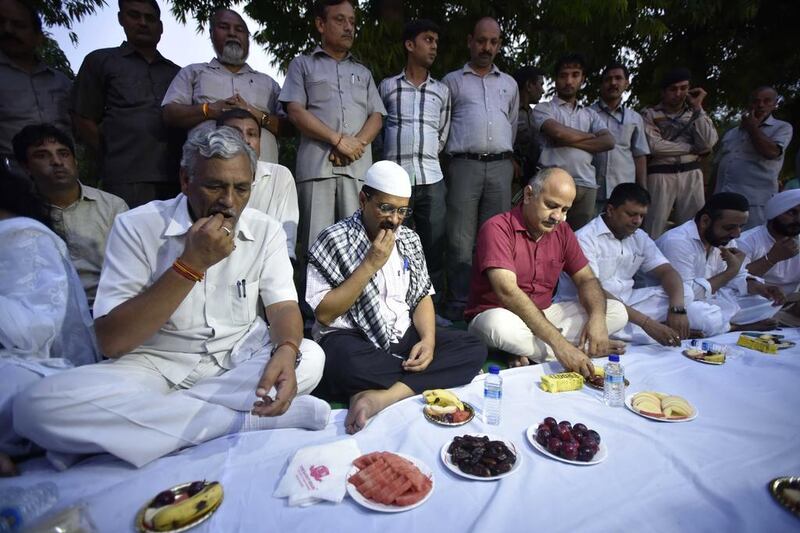As soon as the new crescent moon is spotted in the holy month of Ramadan, the political circles of New Delhi wade into their decades-long tradition: the near-daily multipartisan iftars hosted by politicians and their parties.
The calendar fills up fast. Both Muslims and non-Muslim cabinet ministers, opposition party officials, parliamentarians and top-ranking bureaucrats throw iftar parties, inviting their colleagues from across the political spectrum along with diplomats stationed in Delhi and prominent leaders of the Muslim community.
But the tradition, which seemed to begin in a spirit of inclusiveness, has been criticised for slipping into tokenism. And with prime minister Narendra Modi and his Hindu nationalist Bharatiya Janata Party (BJP) coming to dominate national politics in the last three years, the political iftar is now in danger of vanishing altogether.
India’s first prime minister, Jawaharlal Nehru, frequently invited Muslim friends and colleagues to break their Ramadan fast at his residence or at the Congress Party headquarters. But the political iftar was institutionalised first by Hemvati Nandan Bahuguna, the chief minister of Uttar Pradesh in the late 1970s, and then by prime minister Indira Gandhi.
Mrs Gandhi began hosting regular iftars soon after taking office for her final term, in January 1980. “She wanted to reach out to what she believed were influential sections in the Muslim community,” Adnan Farooqui, a political scientist who teaches at New Delhi’s Jamia Millia Islamia University, said. “It was kind of a short cut, and other parties also took it up in an attempt to reach out to Muslims who would have some kind of political sway.”
__________________________________
More on Ramadan in India
■ From Kuwait to Java: Ramadan traditions from around the world
■ Though challenging, India's Muslim runners continue training during Ramadan
■ Ramadan in Old Delhi: India's oldest mosque bursts into life as the sun sets
_________________________________
The Congress has always been the primary national party to appeal to India’s Muslims, so its members were among the capital’s most active hosts of iftar parties. Pawan Khera, who served as the political secretary to the previous chief minister of Delhi, the Congress’ Sheila Dikshit, remembers attending his first iftar at a Congress leader’s house in 1998.
"It was a new experience for me, where people of different faiths intermingled with a bonhomie that is the soul of a multi-religious society," Mr Khera told The National. "There was respect for those who were fasting, and a curiosity about the concept of Ramadan."
Such iftars played a symbolic role in making India’s biggest minority feel secure in its religious rituals, Mr Khera said. “It’s a message to the minorities: ‘You are free to practice your religion the way you want.’”
The tradition also played a political role, he added. In bringing together politicians from various parties, “iftars definitely helped in visibly ‘centerising’ political parties on the right side of the political spectrum”.
But Dr Farooqui questioned whether the political iftar was ever anything but an expedient gimmick – a tokenism that never accompanied deeper and more pressing governmental action to benefit the Muslim community.
“The breaking of the Ramadan fast is a pious affair,” he said. “It should be very simple. Making a tamasha [spectacle] out of it goes against the essence of it.”
“Even if one were to believe that this exercise in tokenism is an essential exercise in the democratic process, it could be done in an altogether different manner,” Dr Farooqui said. The idea of inviting “influential” Muslims was, in itself, flawed, because it involved a politically strategic judgement on which Muslims were influential and which weren’t.
“So certain members of the clergy – you see them in all the iftar parties,” he said. “But you don’t know how far their influence runs” within the Muslim community itself.
Mr Khera disagreed. “In a country as diverse as ours, these are occasions to bring communities closer. And there should be more such occasions, as the need to contain polarisation has never been felt more.”
Since the BJP came to power three years ago, the Congress has reduced the number of iftar parties it hosts. Last year, it did away with iftars altogether, with the party’s leaders instead distributing packets of food to the Muslim poor in Delhi.
In the late 1990s, when the BJP was last in power, its then-prime minister, Atal Behari Vajpayee, threw iftar dinners every year. Mr Modi, though, has so far not hosted an iftar.
“Other BJP leaders have,” Dr Farooqui said. “But I wouldn’t read too much into it. I don’t see the point of holding these iftars if it does not reflect in the government’s day-to-day actions.”
Mr Khera, though, recalls the spirit of amity at these dinners with some fondness.
The members of opposing parties mingled and broke bread together, in a way that now seems unthinkable, given the superheated, polarised relations between politicians in Delhi today.
“Such [political] acrimony as we see today is not a norm for us,” Mr Khera said. “This is a new and sad change in Indian politics.”
SSubramanian@thenational.ae





